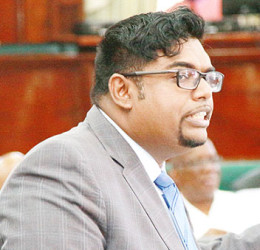Saying the APNU+AFC government’s promised “good life” is an “elusive dream” for the working class, opposition Member of Parliament (MP) Irfaan Ali yesterday charged that the proposed $230 billion national budget was designed in such a way to benefit a “select few,” including ministers and contract workers.
“The statistics reported by the minister suggests an erosion of the well-being of the average person and questions [the] growth story that was read to this honourable House last week,” Ali, who opened this year’s budget debate, said.

The debate will continue until Friday, following which there will be the consideration of the estimates and then a vote on the appropriation bill.
Ali, the former housing minister, spent the better part of his 35-minute-long presentation hammering away at the government’s “good life” promise, which he continuously stressed is far from reality.
He said Finance Minister Winston Jordan, in presenting the budget, attempted to paint a “rosy picture” of the economy using macroeconomic indicators but what he did not say is that the projected 3% economic growth will not enhance the “real spending power” of the average man.
He questioned how one can reconcile the “fairy tale” of increased income when more persons are unable to pay debt and are on the verge of bankruptcy. He charged that many businesses in the loan sector have been hard hit by reduced spending.
“The growth in the non-performing loans for the household sector also speaks volumes of the spending power of the ordinary Guyanese who borrowed from the banking sector,” he said, before providing non-performing loan figures from the Bank from Guyana from 2012 to half of 2015.
The APNU+AFC government took office last May.
Ali also questioned how the Finance Minister could “come to this House and with a straight face tell the Guyanese they enjoy a good life,” when pensioners are being deprived of the electricity and water subsidies and thousands no longer benefit from the $10,000 education cash grant that were instituted under the former PPP/C administration. He also said the government refuses to pass on the benefits of the falling oil prices.
He said that despite the initial denial and some public relations gimmicks, one can see the ‘good life’ benefits trickling down to top government officials and he cited the “substantial increases” in salaries and benefits awarded to Cabinet ministers last year without consultation.
According to Ali, “If you are a minister definitely you would have enjoyed the good life. The Prime Minister, Vice Presidents, Cabinet Ministers and Junior Minister(s) are richer today than when they took up office,” he charged.
Additionally, he charged that contract workers were also “fattened by handsome pay packages” and he said estimates show that contracted employees stand to receive approximately $3.6 billion this year.
Turning his attention to the claim of restored confidence and increased investments last year, Ali said that he admired “the skilfulness of the minister to highlight the potential value of the investments facilitated by Go-Invest and the potential jobs likely to be created rather than just state the actual investments and actual number of new employment opportunities that originated from these investments.”
He pointed out that Appendix 5 of the budget estimates tell a different story about investments as the US$125 million in Foreign Direct Investment (FDI) was significantly below the US$217 million and half the size of the FDI reported in 2014.
He said that FDI is not the only indicator which suggests that the economy is “slipping and slipping downwards.” “The non-performing loans of the business enterprises tell the story better about what is really happening in our local private sector,” he said, while adding that because of the “slowdown” in the economy fewer jobs were created last year by the private sector.
Ali observed that for a government that campaigned on the slogan of creating jobs, the word was mentioned only three times in the budget presentation.
He charged that after almost a year in office, one would have expected to see measures in the budget that would serve to fulfil coalition promises, including lower VAT reduction, a significant increase in the personal income tax threshold and old age pension and public assistance.
He also criticised the reduction of excise tax on motor vehicles under 4 years old, the restriction on importing vehicles older than eight years and the increasing of fees paid on various licences.
“These measures will certainly affect the poor, especially micro, small and medium-scale enterprises, which will now be burdened with higher indirect taxes,” he said, while stressing that the 2016 budget proposes amendments to the Tax Act which will make it mandatory for the licence applicant to file annual returns and clear all outstanding taxes.
“Imagine the reporting burden that the owner of a taxi, donkey cart, video rental business, [and] ordinary small traders will now have to endure to prepare his returns,” he said.
Ali added that putting aside the obvious disregard for the working class, the budget had nothing inside for the sugar and rice sectors, which together contribute over $14.9 billion to the country’s Gross Domestic Product and over $300 million in foreign currency. Jordan had announced that government was planning to inject $9 billion into GuySuCo this year.
Ali also questioned where the good life is for sugar workers, while saying over 1,000 of them will be out of a job. With respect to rice, he said that farmers were promised higher prices per bag of paddy but are “now being punished by lower prices.”




